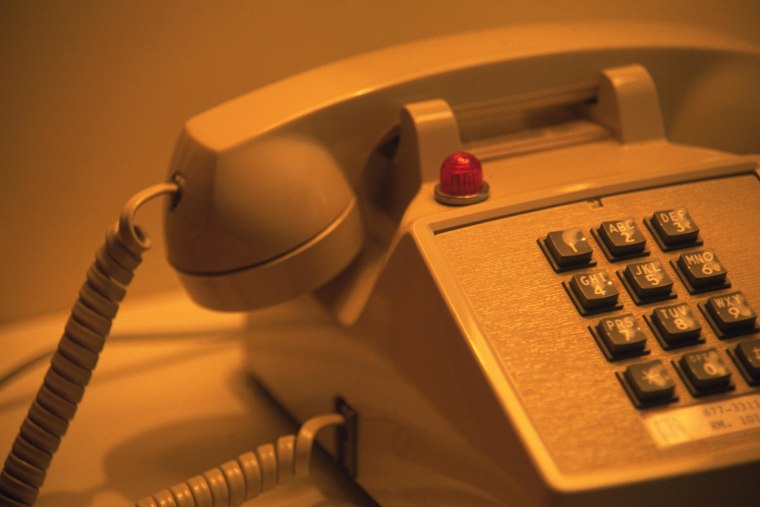We all hate robocalls.
These recorded messages invade our privacy with pitches for all sorts of products and services. They’re also a popular way for telephone scammers to contact their victims. Just this week, the Federal Trade Commission mailed out refund checks for more than $700,000 to people who lost money to the “Rachel from Cardholder Services” robocaller scam. And even though your phone number is on the Do Not Call list, the calls just keep on coming.
Technology exists to block these unwanted and illegal calls on smartphones and landline phones that use an Internet (VoIP) service. But it does not work on traditional analog landline phones. That deployment is being delayed by the nation’s phone carriers.
Read more: Want to get rid of those $#%@ robocalls? There's an app for that
The United States Telecom Association (US Telecom), a trade group which represents phone companies, says its members support third-party call-blocking solutions, but they don’t have the legal authority to allow this technology on their analog networks. The phone carriers cite Federal Communications Commission (FCC) regulations that require them to deliver all calls and specifically prohibit them from blocking any calls.
More than a year ago at a congressional hearing, Sen. Claire McCaskill (D-Mo.) challenged the phone companies to figure out a way to make this technology available to their customers. That hasn’t happened.
“Clearly, the phone providers have been uninterested in implementing technological solutions to reduce fraudulent robocalls – an issue that has plagued American consumers for years,” Sen. McCaskill told NBC News in a statement.
Read More: Why aren't phone companies doing more to block robocalls?
Faced with a massive volume of consumer complaints about robocalls, the National Association of Attorneys General (NAAG) petitioned the FCC to issue an opinion on this issue. Specifically, they asked if phone companies are correct when they say they’re prohibited from implementing call-blocking technology. And then, does that answer change if customers affirmatively opt into this service?
Not much time left to comment
Time is running out to let the FCC know how you feel about this issue. The public comment period closes on Friday, Jan. 23.
And comments are pouring in, thanks to Aaron Foss, the founder of Nomorobo, a free robocall blocking service used by nearly 200,000 people on their VoIP landline phones.
Foss went to FCC headquarters in Washington, D.C. on Tuesday and delivered 24 boxes of call logs for those blocked robocalls. He said he wanted to give the commission a visual representation of just how big the problem is.
He also dropped off more than 25,000 comments from Nomorobo subscribers calling on the FCC to help solve this problem. He’s still collecting comments on his website.
Foss claims Nomorobo blocked more than 13.5 million robocalls last year for its customers. This reporter signed up for the service and the robocalls stopped immediately.
Foss wants to provide the same relief to people with traditional landlines, but he’s run into that brick wall built by the carriers.
“People want this service. They need this service. And it is working for those who can use it,” Foss said.
The phone companies say they already provide customers with several ways to block unwanted calls – such as those from a short list of specific numbers, or all calls that withhold caller ID. Critics say that’s not sufficient.
In written comments to the FCC, the Kedlin Company, which makes the call-blocking Call Control app for smartphones, said the solutions currently provided by the phone companies “do not provide the user with the flexibility or scalability to match the scope of the problem.”
Will this make any difference?
It’s unlikely the phone companies will embrace call-blocking services even if the FCC rules they are not legally prohibited from supporting them.
US Telecom told NBC News the carriers are concerned that “overly aggressive” call blocking could adversely impact their networks. They also have no interest or economic incentive to invest in their old-fashioned analog networks when they’re spending billions to make the switch to Internet phone technology – at the urging of the federal government.
“It would be the equivalent of putting a new sink in your bathroom that you’re planning to completely rebuild in the very near future,” said US Telecom’s Kevin Rupy.
Foss doesn’t buy that argument. He said the backend technology to make his service work on all phone lines should not be cost-prohibitive.
“They need to be forced. They need to be pushed in this right direction to protect everyone getting these annoying calls.”
Herb Weisbaum is The ConsumerMan. Follow him on Facebook and Twitter or visit The ConsumerMan website.
